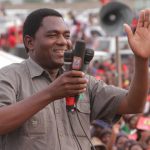Of leadership jaundice
Published on November 19, 2012 at 7:50 AM by FACE OF MALAWI
Sometimes it is good to accept what people say about you. Successful citizens or good leaders always take into account what perceptions people have about them.
Of course, as it has been argued before by many others, perceptions can be wrong or misdirected. But the net effect is: If people believe you are a ‘cartoon’ when you are convinced, and it is true, that you are a normal fellow, it pains a lot.
The best example is the current conversation between the venerable Public Affairs Committee (PAC) and some political leaders, whose bone of contention is an observation that was made at PAC’s recent indaba, that this country is short of transformational leaders and that it has transactional ones.
This is a very interesting observation as we search for the reason behind the country’s stagnation, 50 years after independence, when our neighbours are busy leaping with progress, including those that were at war for some time.
We also add what we have been saying all along, that this country lacks visionary, strategic and inspiring leaders to take the 14 million-plus Malawians out of under-development.
Again, we may be wrong. But our observation of the regimes we have had so far, with the possible exception of the late Dr. Hastings Kamuzu Banda’s, is that the PAC fellows are to a large extent right. Our leaders, since the old man from Kasungu left the stage, are more or less supervisors and/or behave like footmen and women.
In some cases, what we have, like what we saw in Phalombe the other day—when the whole President busied her good-self distributing relief aid—are operatives or good folks doing the wrong things.
Leaders, like the late Kamuzu, the Mandelas, the Obamas, the Chissanos, the Thatchers or Musevenis, inspire and fire their people to be productive, value-add and seek cohesion in tackling national issues and matters that drive the country to a common destiny.
As this article was under compilation, Acheemwa JB was up at the lake opening a private sector group’s AGM which, in the Ngwazi’s days, could have been handled by a Minister of Finance or his colleague in Economic Planning and Development. That is also why the old man of Kasungu had a Minister without Portfolio or a Minister-at-Large to take care of such transactional assignments.
In fact, most such engagements were handled by ministry functionaries as the rest of the Cabinet and President were busy at Sanjika and Capital Hill, strategising.
Further evidence of today’s lack of proper leadership is in the so many government projects that are always in the news for the wrong reasons: Teachers not paid in time, delayed subsidised farm input activities, almost forgotten chiefs’ honoraria, persistent drug shortages in hospitals, endemic forex and fuel shortages, rising nepotism and corruption, or overall non-productivity and inefficiency in the civil service. The list is long.
In criticising all this, PAC, the media and other commentators have nothing to do with incumbent leadership or their tenancy—as we are made to believe. In fact, believing that this is the objective is missing the point and naivety, the very same cancer that Malawi has suffered from over the years.
It is a very sad story when one compares us with, for example, the Americans, who have had a very successful national election based on issues, ideas and performance in key areas of their interest.
Further, it is as if our so-called leaders don’t see these things or that they don’t travel at all. Was it not the other day that Her Excellency took a whole village of cohorts to the US? We thought they were also on an observer mission, to add value to our lives?
Was it a question of eating chips, chicken and hotdogs and sleeping in lavish hotels?
It can be argued that our leaders and political parties are created out of nepotism, tribalism, ‘cowboyism’, cronyism or the self-interest, not the national imperative. If some people don’t believe this, see what has happened in UDF. See where the once mighty MCP is going. Think of what happened at the recent PP convention or what has befallen the once great Aford—which even caused the Ngwazi sleepless nights. Where, we ask, is the just previously-ruling party, the Democratic People’s Party (DPP)?
We indeed have mere operators and excited managers, some of whom also agree that they are in those positions through constitutional accidents or genetic/historic linkages




